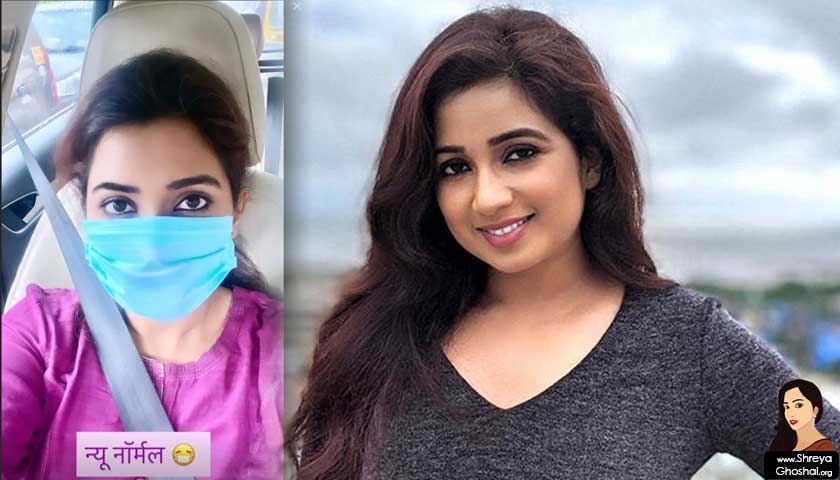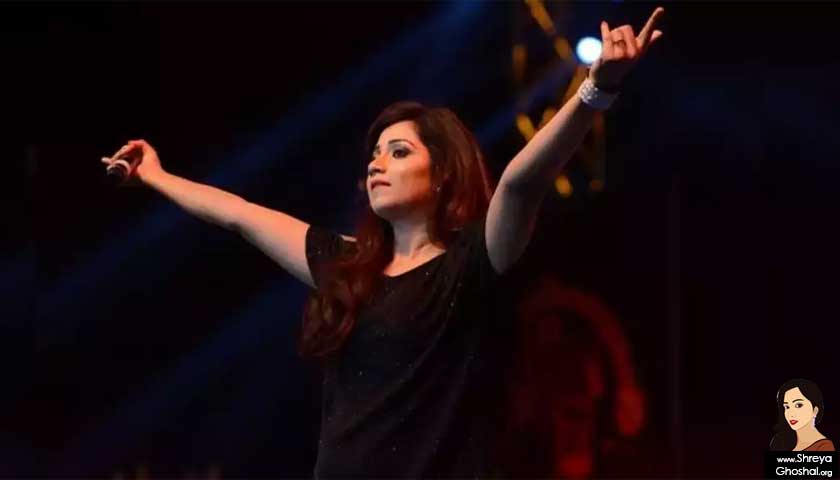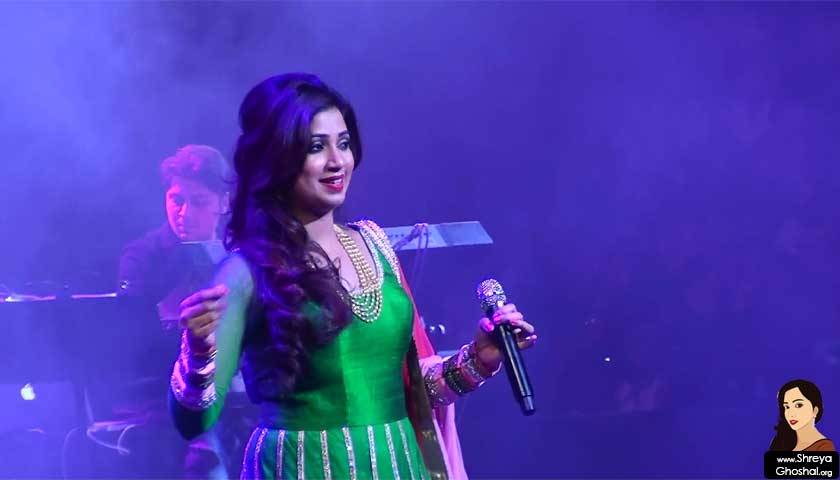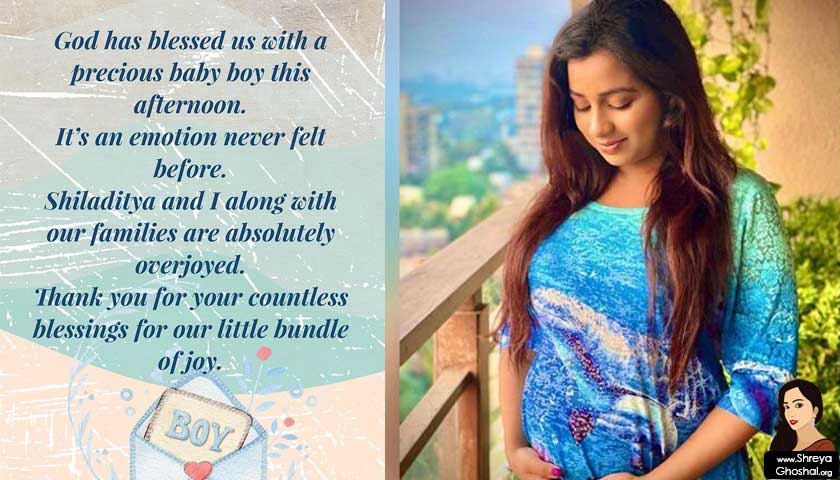Her first ever recorded song was “Ganraj Rangi Nachato” which is a cover version of a Marathi song originally sung by Lata Mangeshkar. Her first studio album was Bendhechhi Beena, which was released on 1 January 1998, with 14 tracks. Some of her earlier albums are O Tota Pakhi Re, Ekti Katha (1999), and Mukhor Porag (2000). Ghoshal recorded Bengali studio album Rupasi Raate (2002). Ghoshal recorded devotional songs in albums like Banomali Re (2002), and later, Krishna Bina Ache Ke (2007).
Shreya Ghoshal career, 2015–20
2015 started with Ghoshal’s another collaboration with A.R. Rahman in Tamil film I. Besides rendering vocals for original Tamil duet “Pookkalae Sattru Oyivedungal” alongside Haricharan, she also dubbed its Hindi version “Tu Chale” alongside Arijit Singh and Telugu version “Poolane Kunukeyamantaa” alongside Haricharan. The original Tamil version song “Pookkalae Sattru Oyivedungal” was met with positive reviews by critics, with most critics praising the vocals of Ghoshal. Nicy V.P. from International Business Times commented on Tamil version, “Haricharan’s crystal clear voice, Shreya’s Hindustani driven singing lead to a chart-buster, here. With regards to Shreya Ghoshal, we have to dig deep the dictionary to come up with some new adjectives to praise her singing.” Later that year, Ghoshal sang the female version of song “Hasi” from film Hamari Adhuri Kahani composed by Ami Mishra which got critical precedence over male version sung by Ami Mishra himself. Devesh Sharma from Filmfare remarked, “The female version of Hasi, sung by Shreya Ghoshal, works better than the male version, sung by guest composer Ami Mishra himself. Ghoshal elevates it with her superb effort and the softer arrangement works better for it overall.” Ghoshal also performed the female version of the song “Gaaye Jaa” for the film Brothers composed by Ajay-Atul which received positive reviews from music critics. The Times of India stated, “Shreya Ghoshal scores brownie points for her rendition”. Glamsham praised Ghoshal’s vocals labelling them “sugary sweet and superbly controlled”. Bollywood Life commented, “Shreya Ghoshal amazes the listener by making this situational song such a great listen and just for her lovely voice, one has to put this song on a loop” The same year saw Ghoshal again collaborating with Sanjay Leela Bhansali in Bajirao Mastani.
She performed three songs in the film, namely “Mohe Rang Do Laal”, “Deewani Mastani” and “Pinga”. She also dubbed these songs in Tamil and Telugu versions of the film’s soundtrack. The qawwali interlude song “Deewani Mastani” in the film fetched her sixth Filmfare Award, fifth for Best female playback singer.
In early 2016, Ghoshal provided vocals for duet “Tere Bin” from film Wazir alongside Sonu Nigam. Composed by Shantanu Moitra and written by Vidhu Vinod Chopra, the song opened to positive reviews by critics. Labelling the song as “a beautiful start for the film”, critics from Bollywood Hungama commented, “Though the sound of song is quite classical for a film which is set in the current times, one can well expect that it would fit in well into the narrative.” Ghoshal was next heard in song “Tum Bin Jiya” in film Sanam Re, composed by Jeet Ganguly. It was a recreation of a song with same title from 2001 film Tum Bin sung by K.S. Chitra and composed by Nikhil-Vinay. The song received positive to negative reviews. Ghoshal sang the songs “Mere Aankhon Se Nikle Aansoo” and “Ishq Ki Baarish” written by Sameer and composed by Nadeem Saifi in the film Ishq Forever for which critics compared Ghoshal singing style to veteran singer Alka Yagnik. For the song “Mere Aankhon Se Nikle Aansoo”, The Times of India commented, “Shreya create magic in the (song), which is straight from the heart. Ghoshal provided vocals for song “Aatach Baya Ka Baavarla” in Marathi film Sairat composed by Ajay-Atul which was well received by critics. Ghoshal’s collaboration with Ankit Tiwari in song “Jab Tum Hote Ho” from film Rustom was critically well received. Devesh Sharma of Filmfare labelled the song “sombre” and praised use of Ghoshal’s “melodious” voice in the song. Ghoshal was next heard in Tamil film Devi in which she rendered her vocals for song “Rang Rang Rangoli”. Ghoshal also dubbed Hindi version of the song titled “Ranga Re” as the film was released along with Tamil in Hindi and Telugu as well with Telugu version “Rang Rang Rangare” being sung by Swetha Mohan. India West praised the Hindi version by quoting, “Ghoshal proves that she can tread Sunidhi Chauhan terrain effortlessly in parts of the song, and her strong vocals once again put up a strong case for playback singers (females)”. The Tamil version of song also opened to positive reviews.
In early 2017, Ghoshal rendered “Aashiq Surrender Hua” duet along with co-singer and composer Amaal Mallik from the film Badrinath Ki Dulhania. the song in itself was much appreciated for its quirky lyrics which were penned down by lyricist: Shabbir Ahmed. “Aashiq Surrender Hua” was one of the rare songs in which Ghoshal was heard in a lower register than what she usually sings in. As Swetha Ramakrishnan from Firstpost reiterated, “The best thing about the song is Shreya Ghoshal singing in a lower pitch; something one rarely gets to hear.” In regards to the singers, Gaurang Chauhan from Bollywood Life stated, “Both are a unique choice for such a song and they nail it.” Ghoshal was next heard in “Rozana” from the film Naam Shabana for which Ghoshal’s vocals were specifically met with critically positive reviews. Shriram Iyengar from Cinestaan mentioned, “Ghoshal’s voice brings a mesmerising touch to the song, with a perfect balance of happiness and contentment.” Praising Ghoshal’s vocals in “Rozana”, India West commented, “To say that she makes the best out of this increasingly rare occasion in film music is superfluous.” Apart from rendering vocals for A R Rahman composed ‘Do Dilon Ke’ duet along with Hariharan in the Hindi dubbed version of the film: Viceroy’s House, Ghoshal also lent her voice for duet ‘Hans Mat Pagli ‘in Toilet: Ek Prem Katha alongside Sonu Nigam. Both songs were critically acclaimed. Joginder Tuteja from Bollywood Hungama stated that “The combination of Sonu-Shreya takes the song to a different altogether and worthy of repeat hear.”
In 2017, Ghoshal also sang the duet “Thodi Der” with co-singer and music director Farhan Saeed for the film Half Girlfriend. She received a Filmfare Award for Best Female Playback Singer nomination for the song. Komoi stated, “Ghoshal’s voice as sweet as honey mesmerizes the listener in Thodi Der”. Glamsham reported, “Ghoshal is simply fantastic and (song) can be put on repeat mode”. In the same year, Ghoshal sang two songs in fifth episode of Mixtape, a web series launched by T-Series for which she received positive response. Ghoshal’s four Kannada songs were included in The Times of India list of “10 Best Romantic Songs of 2017”, which are “Usire Usire” from Hebbuli, “Ondu Malebillu” from Chakravarthy, “Ninna Snehadinda” from Mugulu Nage and “Chippinolagade” from Maasthi Gudi. Her Telugu song “Blockbuster” from Sarrainodu was voted as number one in 10 Best Party Songs of 2017 by the same.
2018 started for Ghoshal collaborating with S. Thaman for the song “Mandhaara” from Bhaagamathie. She later provided her rendition for “Allasani Vaari” from Tholi Prema. She also lent her voice to four songs for the delayed film Phir Se… (2018). Ghoshal continued with song Ghoomar from the period drama Padmaavat, along with Swaroop Khan. Composed by film’s director Sanjay Leela Bhansali himself, it was based on the traditional music and dance forms performed by the Rajput queens of Rajasthan. The song was well received, with critics praising Ghoshal for her rendition. Gaurang Chauhan from Times Now noted that the song “is appealing and will be, if not already, a favourite among dance performers across India.” “Ghoomar” went on to earn Ghoshal the Filmfare Award for Best Female Singer. She was next heard in the recreated version of “Ek Do Teen” from Tezaab (1988) in Baaghi 2 and the title track of Dhadak (2018).
Ghoshal started 2019 with two classical numbers, “Ghar More Pardesiya” and “Tabah Ho Gaye” for Abhishek Varman’s period drama Kalank, for which she won numerous awards and accolades including a Zee Cine Award for Best Female Playback Singer. Later, sang “Yeh Aaina” for the film Kabir Singh, composed by Amaal Mallik and written by Irshad Kamil, which was picturised on the film’s lead Shahid Kapoor and supporting actress Nikita Dutta, and “Habibi Ke Nain” along with Jubin Nautiyal, composed by Sajid-Wajid, for the film Dabangg 3. Later that year, she was also heard as the lead singer, in a first, alongside fellow singer and rapper Mellow D, on Kiske Liye Tu Marega and Dega Jaan, two versions of the upbeat title track of Raj Nidimoru and Krishna D.K.’s Manoj Bajpayee – starrer Amazon Prime Video original series The Family Man, composed by Sachin-Jigar. Her rendition of the tracks was widely praised, with the lyrics receiving appreciation for being an ode to middle class struggles in the Indian society.




